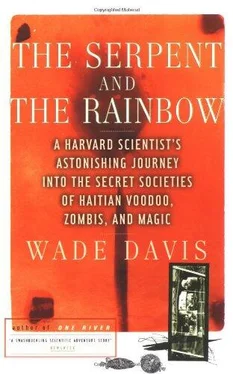Wade Davis - The Serpent and the Rainbow
Здесь есть возможность читать онлайн «Wade Davis - The Serpent and the Rainbow» весь текст электронной книги совершенно бесплатно (целиком полную версию без сокращений). В некоторых случаях можно слушать аудио, скачать через торрент в формате fb2 и присутствует краткое содержание. Год выпуска: 1985, Издательство: Simon & Schuster, Жанр: Старинная литература, на английском языке. Описание произведения, (предисловие) а так же отзывы посетителей доступны на портале библиотеки ЛибКат.
- Название:The Serpent and the Rainbow
- Автор:
- Издательство:Simon & Schuster
- Жанр:
- Год:1985
- ISBN:нет данных
- Рейтинг книги:5 / 5. Голосов: 1
-
Избранное:Добавить в избранное
- Отзывы:
-
Ваша оценка:
- 100
- 1
- 2
- 3
- 4
- 5
The Serpent and the Rainbow: краткое содержание, описание и аннотация
Предлагаем к чтению аннотацию, описание, краткое содержание или предисловие (зависит от того, что написал сам автор книги «The Serpent and the Rainbow»). Если вы не нашли необходимую информацию о книге — напишите в комментариях, мы постараемся отыскать её.
The Serpent and the Rainbow — читать онлайн бесплатно полную книгу (весь текст) целиком
Ниже представлен текст книги, разбитый по страницам. Система сохранения места последней прочитанной страницы, позволяет с удобством читать онлайн бесплатно книгу «The Serpent and the Rainbow», без необходимости каждый раз заново искать на чём Вы остановились. Поставьте закладку, и сможете в любой момент перейти на страницу, на которой закончили чтение.
Интервал:
Закладка:
It was his view that in the aftermath of the war of independence, and in the face of a history of betrayal at the hands of the military leaders, the struggle of the Maroons had continued. In certain parts of the country Maroon bands had persisted as late as 1860 but on the whole, as the ex-slaves took to the land and the vodoun society was born, the role of the Maroons was transformed from fighting the French to resisting a new threat to the people—an emerging urban economic and political elite distinguished not by the color of their skin but by the plans they harbored for both the land and labor of the peasants. And whereas the war with the French could be won, the new struggle promised to be a permanent feature of peasant life. From overt and independent military forces, the Maroons went underground and became a clandestine institution charged with the political protection of the vodoun society. Thus were conceived the immediate predecessors of today’s secret societies. As the Maroons fought for liberty, the contemporary secret societies, according to Laguerre, “stand strong to keep safe the boundaries of power of their local communities and to keep other groups of people from being a threat to their communities.”
If Laguerre was correct—and his was the only explanation that made sense to me—the implications were clear. From the leading medical authorities in Port-au-Prince I had been told that zombification was a criminal activity that had to be exposed and eradicated for the collective good of the nation, but now a quite different scenario presented itself. In the minds of the urban elite, zombification might well be criminal, but every indication suggested that in the vodoun society it was actually the opposite, a social sanction imposed by recognized corporate groups whose responsibility included the policing of that society. Zombification had always struck me as the most horrible of fates. Now, if what I was beginning to think was true, I realized that it had to be. After all, what form of capital punishment is pleasant?
I knew from my own research that in at least some instances the zombi powder was controlled by the secret societies, and a knowledge of poisons and their complex pharmacological properties could be traced in a direct lineage from the contemporary societies to the Maroon bands, and beyond to the secret societies of Africa. There was no doubt that poisons were used in West Africa by judicial bodies to punish those who broke the codes of the society, and Hurston had suggested that the same sort of sanction was applied among the secret societies of Haiti. I had every reason to believe that Ti Femme and Clairvius Narcisse had received a poison, and that at the time of their demise they were both pariahs within their respective communities. Narcisse’s transgression was directly related to access to land, precisely the sort of issue that, according to Laguerre, would attract the attention of the secret society. By his own account, Narcisse had been taken before a tribunal, judged, and condemned. The possible link to the tribunals of West Africa was obvious. What’s more, Narcisse had referred to those who had judged him as the “masters of the land,” and had implied that he would only encounter more trouble if he created further problems himself. Finally, Max Beauvoir had told me directly that the answer to the zombi mystery would be found in the councils of the secret societies.
If my identification of the zombi poison revealed a material basis for the phenomenon of zombification, the work of Michel Laguerre combined with the information provided by Max Beauvoir and others finally suggested a sociological matrix. And once again, the indomitable Zora Neale Hurston provided a critical clue.
In October 1936, a naked woman was found wandering by the roadside in the Artibonite Valley. She directed the authorities to whom she was taken to return her to her family land, and there she was identified by her brother. The woman’s name was Felicia Felix-Mentor. Like Ti Femme she was a native of Ennery, and twenty-nine years before she had suddenly taken ill, died, and been buried. Death certificates and the testimony of her ex-husband and other family members seemed to support her account. When found she was in such a wretched condition that the authorities, after her identification in Ennery, placed her in a hospital in Gonaives, and it was there that Zora Neale Hurston found her. In Hurston’s own words, the woman was a dreadful sight—a “blank face with dead eyes” and eyelids “white as if they had been burned with acid.”
Hurston remained with the reputed zombi for only a day, but she came away from the encounter quite able to tell the world just about everything there was to know about the phenomenon. Unfortunately, nobody believed her. For example, she later wrote that she and the attendant physician “discussed at great length the theories of how zombies came to be. It was concluded that it is not a case of awakening the dead, but a matter of a semblance of death induced by some drug known to a few. Some secret probably brought from Africa and handed down generation to generation. The men know the effects of the drug and the antidote. It is evident that it destroys that part of the brain which governs speech and will power. The victim can move and act but cannot formulate thought. The two doctors expressed their desire to gain this secret, but they realize the impossibility of doing so. These secret societies are secret [italics mine].”
When Hurston published this hypothesis in 1938 in Tell My Horse , it was ignored in the United States, while in Haiti it earned her the scorn of the intellectual community. It wasn’t that the notion of a poison seemed impossible. On the contrary, the belief in the poison was so common that virtually every subsequent student of Haitian culture would make some reference to it. Alfred Métraux’s suggestion that the “hungan [sic] know the secret of certain drugs which induce a lethargic state indistinguishable from death” was typical. And though most anthropologists remained equivocal, the Haitians themselves recognized the existence of the poison with such assurance that it was specifically referred to in the Penal Code.
Hurston’s problem was less one of credibility than of timing. Her report appeared just in the period when Haitian social scientists trained in the modern tradition were most anxious to promote the legitimacy of peasant institutions. These intellectuals were still smarting from the sensational publications that had emanated from the United States, which in their minds had both slanderously misrepresented the Haitian people and rationalized the American occupation. The subject of zombis, which had figured so prominently in these books, as it would later in low-budget Hollywood movies, was simply anathema to them. Unworthy of serious consideration, the embarrassing phenomenon was dogmatically consigned to the realm of folklore. Zora Neale Hurston, meanwhile, whose insight, if encouraged and pursued, might have solved the zombi mystery fifty years ago, bore the brunt of her colleagues’ contempt.
In defense of her critics, it must be said that her case for the poison hypothesis was suspect on several grounds. First, many informants insisted that the actual raising of a zombi depended solely on the magical power of the bokor. Secondly, despite the provocative case of Felicia Felix-Mentor, no physician had examined an indisputably legitimate case. And finally, of course, no one had penetrated the cults to obtain a sample of the reputed poison. Hurston did not help her position by concluding that “the knowledge of the plants and the formulae are secret. They are usually kept in certain families and nothing will induce the guardians of these ancient mysteries to divulge them.” Here, unfortunately, Hurston was unduly influenced by the warnings she had received from Haitian medical authorities, who had obviously sought the formula in a completely inappropriate manner. In one instance, for example, a zealous physician had used his connections to have a bokor imprisoned on no charges and threatened with a long term unless he divulged the secret. Not surprisingly, the recalcitrant old man refused, saying it was a mystery brought over from Guinée, which he would never reveal. From these same authorities Hurston received the dire warnings that may have prevented her from pursuing the mystery. “Many Haitian intellectuals,” she was told, “are curious, but they know that if they dabble in such matters, they may disappear permanently.” If she persisted in her desire to contact the secret societies directly, she was told, “I would find myself involved in something so terrible, something from which I could not extricate myself alive, and that I would curse the day that I had entered upon my search.”
Читать дальшеИнтервал:
Закладка:
Похожие книги на «The Serpent and the Rainbow»
Представляем Вашему вниманию похожие книги на «The Serpent and the Rainbow» списком для выбора. Мы отобрали схожую по названию и смыслу литературу в надежде предоставить читателям больше вариантов отыскать новые, интересные, ещё непрочитанные произведения.
Обсуждение, отзывы о книге «The Serpent and the Rainbow» и просто собственные мнения читателей. Оставьте ваши комментарии, напишите, что Вы думаете о произведении, его смысле или главных героях. Укажите что конкретно понравилось, а что нет, и почему Вы так считаете.












